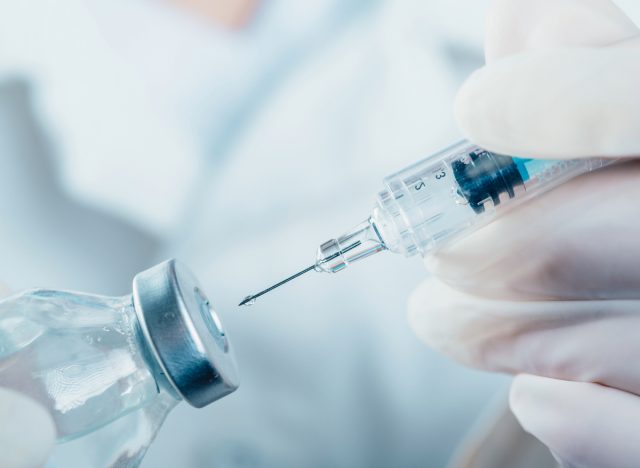If you’re a dedicated gym-goer who likes to stay physically fit, we have some news you’ll be interested to hear. In a study published in the Journal of Pharmacology and Experimental Therapeutics in Sept. 2023, researchers tested a newly developed compound ‘exercise drug’ on mice, with the goal of investigating whether it could have potential health and fitness applications for humans.
The results indicated that the mice successfully received the health benefits of exercise without actually exercising. It’s obvious that, if it works, this would have huge implications for the fitness world. But is the idea that one day people won’t need to exercise to stay in shape just too good to be true? Let’s just say you probably shouldn’t ditch your gym membership or toss out your running shoes just yet. Keep reading to learn more about the preliminary research, and when you’re finished, be sure to check out This Is the New ‘Magic Number’ of Days You Need to Exercise To See Results, Study Says.
The ‘exercise drug’ study:


The exercise drug, known in its current form as SLU-PP-332, was created and tested by a team of University of Florida pharmacy professors led by Thomas Burris. According to the University of Florida press release, obese mice were treated two times a day for a month with SLU-PP-332. The researchers assessed a variety of metabolic parameters.
Essentially, the drug hones in on a group of bodily proteins called ERRs, which are in charge of triggering some of the most crucial metabolic pathways in “energy-gobbling tissues” such as the heart, brain, and muscles. ERRs are more lively when you’re working out, but they’ve been more challenging to stimulate with drugs. However, in a March 2023 paper written by the researchers, the team was successful at creating SLU-PP-332 to enhance the activity of ERRs.
The findings:
Treating obese mice with SLU-PP-332 two times a day for one month helped them accumulate 10 times less fat compared to the mice that were not treated; it also resulted in a 12% reduction in body weight. Even when being treated, the mice continued to consume the same amount of food and didn’t engage in any increased physical activity.
The press release points out that the exercise drug aided in weight loss among the treated mice by making the muscles believe they were working out more than they actually were, resulting in a boosted metabolism. The drug also enhanced endurance, as the mice ran almost 50% further than they were previously able to.
Burris, who spearheaded the research for the new drug, explained via the press release, “This compound is basically telling skeletal muscle to make the same changes you see during endurance training. When you treat mice with the drug, you can see that their whole body metabolism turns to using fatty acids, which is very similar to what people use when they are fasting or exercising. And the animals start losing weight.”
That sounds promising, but what comes next? The press release notes that turning SLU-PP-332 into a “drug candidate” by making it a pill rather than an injection is crucial. Researchers would then further test the drug’s potential side effects in more animal trials, and, if successful, it would ultimately proceed to human trials.
READ RELATED: Major Pharmacies Can Now Offer Abortion Pills—Here’s What to Know
Could SLU-PP-332 replace working out as we know it?


So what does this new exercise drug mean for traditional exercise? We spoke with Dr. Stacie Stephenson, a recognized leader in functional medicine and bestselling author of Glow: 90 Days to Create Your Vibrant Life from Within, who shares her insight on the topic.
“This is just one more in a long line of fads that give people a reason not to engage in the very natural movement all our bodies need,” Dr. Stephenson explains. “Not only has this not yet been tested on humans and we have no idea of effectiveness or potentially harmful side effects, but a drug that activates fatty acid metabolism only does one tiny part of what exercise does for people.”
She stresses the importance and need of moving your body to sculpt lean muscle, boost your mood, burn fat, and activate detoxification and circulation processes. “Why take a drug that does just one of those things? Like those other trendy weight loss drugs, which have extreme side effects including their astronomical cost, I see this as something that offers minor benefits along with major risks, when you could just go outside and take a walk and eat real food. Health isn’t that complicated,” Dr. Stephenson adds.
In short, while the study does offer very intriguing initial results about something that may one day prove to be a game-changer in the fitness realm, it’s a very long way off—if it even succeeds in making it to market.
Alexa Mellardo








